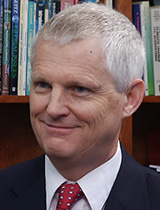The University of Arizona will award degrees to more than 5,200 students this weekend, and that marks the end of a year with budget cuts and rising tuition.
Next year, the University will face more of the same. AZPM Reporter Vanessa Barchfield interviewed Provost Andrew Comrie for this edition of Metro Week. Excerpts from their conversation show the array of challenges the institution is facing in the next year.
The freshman class is the largest and most diverse, and the graduating class is the largest. "That's always exciting when the university is growing and we are serving so many more students than we did before," Comrie said.
 University of Arizona Provost Andrew Comrie, 2015.
University of Arizona Provost Andrew Comrie, 2015.
On budget cuts and increasing tuition, is higher education in a crisis? "I think higher education may not be in a crisis but it's certainly in a state of change," he said. "I think it's often been in a state of change and not as visible as it is now."
Arizona tuition is still a "big bargain" compared to other states, he said. Tuition has gone up as state support has decreased "but that doesn't make the education any less worthwhile."
Young immigrants who have been granted Deferred Action For Childhood Arrivals, a status that allows them to work and live legally in the U.S. temporarily, now qualify for in-state tuition. What does that mean to the U of A? "It's going to mean great opportunity for those students," Comrie said. "Now they'll be able to compete just like anybody else to do well."
"I think the budget implication is going to be very minor," he said.
How is the University coping with the loss of $28.4 million in state funding? "Cuts are never easy to do," he said. "We right now are in the middle of making those plans."
"We expect much like past cuts that will involve probably some personnel, it's going to involve some programs, maybe some of our facilities. We're busy assessing all of those right now," he said.
On investing in growing some programs, even amid budget cuts: Priorities for funding include services that students need, including continued focus on out-of-classroom experiences such as work and internships, he said.
"It's making sure we can both reduce things that perhaps are just a little less critical or that we can change or do without, or modify. At the same time as being sure we also invest in things that we really need," he said. "Generally they're all aimed at the quality of education."
Two new programs include a veterinary school and the expansion of online education.

By submitting your comments, you hereby give AZPM the right to post your comments and potentially use them in any other form of media operated by this institution.